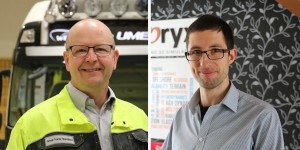Algoryx is working within a European consortium that addresses virtual commissioning of smart factories. The consortium has been awarded an EU grant over three years to develop standards and tools to enable the implementation of virtual twins of factories. Before the factory even exists, the virtual twin is used to design, plan and optimize. When the factory is being built the virtual twin is used for virtual commissioning, and eventually when the factury is in full production the digital twin is used to monitor, optimize and upgrade the factory.

The factories addressed for prototype implementations will be those by Volvo Global Trucks Operations in Umeå, Sweden and by Daimler in Germany. Volvo has recently established a Volvo Cab Competence center in Umeå, next to its #1 factory, which is one of the most automated factories in the world. The Volvo Cab Competence Center will spread experience and competence to all other factories within Volvo.
European industry is facing a digitalization paradigm. Next generation factories will be more automated and autonomous, provide higher precision and quality, be built and commissioned faster, be more sustainable, and will also be much more adaptive. The project, ENTOC (“Engineering Tool Chains for Efficient and Iterative Development of Smart Factories”) will develop the necessary of software tools and standards that allow the entire ecosystem that is involved in building a factory to contribute also to the virtual twin of the factory. The Swedish consortium consists of Volvo GTO, Algoryx Simulation, Schneider Electric and Chalmers University of Technology – a good mix of traditional industry, a fast growing hightech SME, and academia. In Sweden, the project is jointly funded by the Swedish innovation agency Vinnova and the industry.
The German consortium consists of Daimler, EDAG, IFAK, Festo, Tarakos, EKS InTec and TWT and is jointly funded by German innovation agencies and the industry partners. ENTOC is part of the ITEA program and the EU EUREKA cluster programs.
“We already run our control code in a virtual environment”, says Magnus Johansson of Volvo Cab Competence Center. “Now we take the first step in creating a virtual twin environment of an entire process line where changes in production can be planned and commissioned with high precision for minimal commisioning time in the real factory. Therefore, the virtual twin must behave just like reality.”
With a high fidelity virtual twin of a production cell – with logics, mechanics, safety, electric systems, motion patterns, kinematics, sensors and all connected equipment, it is possible to test functionality with respect to production quality, resource management, maintenance, process stability and costs.
The ENTOC project will develop a demonstrator annually to illustrate the possibilities of working with digital twins. The first demonstrator will be ready at the end of 2017.
“With physics based simulation and dynamics, the manufacturing industry can boost their innovation pace, increase precision in planned maintenance and avoid expensive failures and risks”, says Michael Brandl, project manager for ENTOC at Algoryx.
Chalmers contributes with expert competence on how smart, automated, digital tools can be used to give factory engineers more efficient decision support.
“We develop new ways to formalize specifications that are sustainable and useful througout the entire development and commissioning of the production process.”, says Dr Petter Falkman from the Department of Signals and Systems at Chalmers.
Schneider Electric will contribute with control systems software, servos, technical advice and other critical components.
For further information, contact:
Algoryx Simulation AB
Kenneth Bodin, CEO
Phone: +46-70-6315520
Email: kenneth.bodin@algoryx.se

